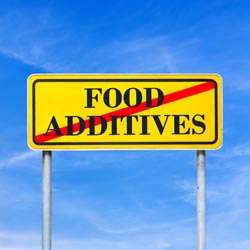Brain-Gut Connection
Find your care
Our compassionate GI nutrition experts provide outstanding personalized care. Call 310-206-6279 to connect with a specialist.
This past weekend I attended the gut microbiome conference in Huntington Beach, California. What a wonderful conference! One of the big nutritional take-aways was the potentially destructive nature of specific food additives on our gut microbiome (the healthy bacteria that live in our digestive tract). The two main food additives discussed were polysorbate 80 and carboxymethylcellulose.
Polysorbate 80 and carboxymethylcellulose are emulsifiers, meaning they help fat and water to mix (which they usually do not --- just try to mix cooking oil and water!). Both are found in foods such as chocolate bars, ice cream and condiments, giving these items a smooth and creamy appearance and mouth feel.
Preliminary research on mice has shown that these food additives can potentially promote inflammation in the gut as well as increase intestinal permeability (see June 2016: "I think I have Leaky Gut!" for more information). There was even research that the changes that occurred to the gut microbiome due to these food additives placed the test mice at higher risk for obesity, diabetes and metabolic syndrome.
My advice --- eat as close to the earth as possible. We are all going to eat processed foods on occasion, and these can be part of a healthy well-rounded diet, but try to make most of your meals from whole foods. Focus on whole grains, beans, legumes, nuts, seeds, vegetables, fruits, lean animal proteins and nonfat or low-fat dairy products if tolerated. And when you do consume packaged food, read the ingredients list carefully. Choose products with the fewest ingredients and where you recognize all ingredients used.
Leaky gut ---- I am asked about this term by patients several times per week --- they were either diagnosed with it by an alternative practitioner, read about it on the internet, or were told by a family member or friend about it. So what is leaky gut and who has it?
Normally, the gut is lined with a layer of cells called the mucosa that acts as a protective barrier and selectively allows small molecules (water, nutrients, electrolytes) to pass through while keeping bacteria and other possibly harmful elements out. This selectivity is possible because of the space between the cells, called tight junctions, that when strong can mediate what is allowed through and what is kept out.
When the tight junctions become weak, they allow gases, bacteria and fluid to pass through, which can lead to symptoms such as diarrhea, gas, bloating and abdominal discomfort. Western medicine prefers to use the term intestinal permeability to describe this phenomenon.
Intestinal permeability is most likely to occur if the gut is damaged by some insult or trauma; bacterial or parasitic infection, chemotherapy/radiation, chronic stress, chronic digestive disease (celiac disease, IBS), or abuse of alcohol or NSAIDs. It is also possible that those with autoimmune conditions are at greater likelihood for intestinal permeability, especially if the condition is not well managed.
At this time, there are no good diagnostic tools for intestinal permeability. If you think you have intestinal permeability, or leaky gut, make sure to talk with your gastroenterologist and meet with a specializing dietitian to discuss possible treatment plans.
Most of us understand the importance of working out our bodies, whether pumping iron at the gym, taking a dance class or getting on the treadmill. We also know how important it is to keep our minds sharp with reading, debating, studying, asking questions and taking classes. But how many of us workout our minds on a regular basis? Meditation, especially mindfulness meditation, is a practice that helps to exercise the mind.
There is a lot of misinformation about meditation in the media - you must become still, you have to be calm, sit in lotus pose and release all thoughts. My response... good luck with that! Meditation helps us to understand the true nature of the mind and work with this nature. The mind does not like to stay in the present moment, it prefers to be active, jumping from the past to the future, judging, critiquing, analyzing, planning, desiring, wanting, craving or avoiding. Sound familiar? This is everyone's mind, this is how it works.
Instead of gripping or avoiding the nature of the mind, meditation encourages us to sit with whatever arises - emotions, thoughts, sensations. Doing this helps to create new neural pathways, decrease stress, reduce pain, and even improve digestion. Intrigued? Try the brief meditation below and consider looking up meditation studios in your neighborhood and taking an introduction to meditation class.
From the book Flip the Switch: 40 Anytime, Anywhere Meditations in 5 Minutes or Less by Eric Harrison
- Sit comfortably on a chair, sofa or the floor
- Sigh three or four times to open up your breathing: big in-breath, full out-breath and pause at the end
- Breathe deeply and slowly for two to three minutes
- Focus on moving out the lower ribs and the belly
- Make sure the shoulders are not rising and falling
- Think horizontally: "out, in" not "up, down"
- Let go completely on each out-breath. Pause as long as you like at the end
- Eventually let the breath be "free" - don't control it at all
- Stay quiet by gently watching the breath as long as you like


